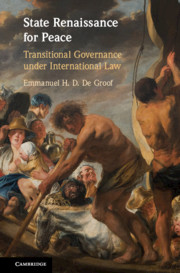Book contents
- Reviews
- State Renaissance for Peace
- State Renaissance for Peace
- Copyright page
- Dedication
- Contents
- Tables
- Foreword
- Preface
- Acknowledgements
- Additional material
- Abbreviations
- Introduction Transitional Governance Today
- Part I The Unchartered Territory of Transitional Governance
- Part II Foundation and Actors of Transitional Governance * Sources of Ius in Interregno
- Part III Self-Determination through Transitional Governance
- Part IV Moderating External Influence on Transitional Governance
- 8 Limits to External Involvement with Transitional Governance
- 9 The Inducement of Oppositional Transitional Governance
- 10 Indirect Regime Change
- General Conclusion
- Index
9 - The Inducement of Oppositional Transitional Governance
from Part IV - Moderating External Influence on Transitional Governance
Published online by Cambridge University Press: 10 September 2020
- Reviews
- State Renaissance for Peace
- State Renaissance for Peace
- Copyright page
- Dedication
- Contents
- Tables
- Foreword
- Preface
- Acknowledgements
- Additional material
- Abbreviations
- Introduction Transitional Governance Today
- Part I The Unchartered Territory of Transitional Governance
- Part II Foundation and Actors of Transitional Governance * Sources of Ius in Interregno
- Part III Self-Determination through Transitional Governance
- Part IV Moderating External Influence on Transitional Governance
- 8 Limits to External Involvement with Transitional Governance
- 9 The Inducement of Oppositional Transitional Governance
- 10 Indirect Regime Change
- General Conclusion
- Index
Summary
Indirect regime change is, in principle, forbidden under international law because it affects the heart of a state’s domaine réservé. The inducement of oppositional TG aims at indirectly reconfiguring the constitutional order of the target state through TG. Applied as a coercive unilateral measure, it is hard to sustain that this practice complies with the principle of non-intervention. This conclusion suffers a theoretical and rather improbable exception: the scenario of constitutional texts explicitly and directly validating ius cogens violations. Another exception, which could become less theoretical, is when the UNSC induces an oppositional transition under Chapter VII of the UN Charter, or authorises states to do so as a way to cope with a threat to or breach of international peace and security. In such cases, the UNSC could only empower an oppositional TA after a conscientious assessment of the TA’s compliance with ius in interregno.
Keywords
- Type
- Chapter
- Information
- State Renaissance for PeaceTransitional Governance under International Law, pp. 315 - 336Publisher: Cambridge University PressPrint publication year: 2020

